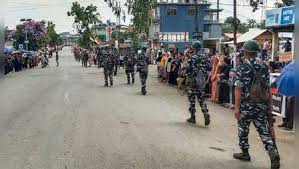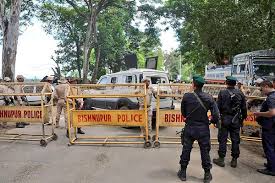Introduction
In the northeastern state of Manipur, India, a fresh escalation of tensions has arisen as security forces face resistance from Meitei women groups, impeding their access to a conflict-ridden area. The incident underscores the complexities inherent in managing regional conflicts and the delicate balance between security imperatives and local sentiments. This article delves into the incident, its implications, and the broader context of the ongoing conflict in Manipur.

The Incident
A recent gunfight erupted in Manipur, further exacerbating an already strained security situation in the region. However, what sets this incident apart is the active involvement of Meitei women groups in obstructing the movement of security forces towards the conflict zone. This marks a significant departure from conventional dynamics, underscoring the deep-rooted local sentiments and the extent to which they are influencing the course of events.
Local Sentiments and Conflict Dynamics
Manipur has been a region fraught with various ethnic and political tensions, primarily stemming from issues related to identity, autonomy, and resource distribution. The Meitei community, a major ethnic group in the state, has historically sought greater recognition and autonomy within the Indian federal structure. This has often led to conflicts with both the central government and other ethnic groups vying for influence and control in the region.
The involvement of Meitei women groups in preventing security forces from reaching the conflict zone reflects a broader sentiment of dissatisfaction with the state’s handling of the situation. This illustrates the depth of local grievances and the complex interplay between gender dynamics, ethnicity, and political agency. The Meitei women’s actions highlight their active participation in shaping the narrative and outcomes of the conflict, challenging traditional gender roles and amplifying their voices in matters of societal importance.
Implications and Challenges
The incident raises critical questions regarding the appropriate approach to conflict resolution in regions like Manipur. The resistance put forth by Meitei women groups underscores the need for a more nuanced and inclusive strategy that acknowledges the multifaceted nature of local aspirations. Ignoring or undermining such sentiments could further escalate tensions and lead to increased instability.
Balancing the imperatives of maintaining law and order with respect for local sentiments is a complex task. The involvement of women in conflict dynamics, as witnessed in this incident, necessitates an inclusive and gender-sensitive approach to conflict resolution. Failure to account for the diverse voices within Manipur could lead to the perpetuation of cycles of violence and unrest.

Conclusion
The recent gunfight in Manipur, coupled with the active resistance of Meitei women groups against security forces, provides a stark reminder of the intricate challenges associated with conflict management in diverse and ethno-politically sensitive regions. The incident emphasizes the need for a comprehensive, inclusive, and empathetic approach that addresses the concerns of all stakeholders. By doing so, a pathway towards sustainable peace and stability in Manipur can be charted, one that respects local sentiments while upholding the rule of law. As India navigates the complexities of its federal structure, the case of Manipur serves as an important lesson in balancing security imperatives with the aspirations of its diverse populace